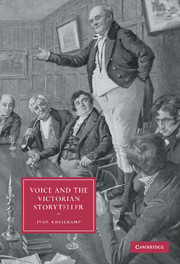Book contents
- Frontmatter
- Contents
- Acknowledgments
- 1 “The best man of all”: mythologies of the storyteller
- 2 When good speech acts go bad: the voice of industrial fiction
- 3 Speech on paper: Charles Dickens, Victorian phonography, and the reform of writing
- 4 “Done to death”: Dickens and the author's voice
- 5 Unuttered: withheld speech in Jane Eyre and Villette
- 6 “Hell's masterpiece of print”: voice, face, and print in The Ring and the Book
- 7 A voice without a body: the phonographic logic of Heart of Darkness
- Notes
- Bibliography
- Index
- CAMBRIDGE STUDIES IN NINETEENTH-CENTURY LITERATURE AND CULTURE
6 - “Hell's masterpiece of print”: voice, face, and print in The Ring and the Book
Published online by Cambridge University Press: 22 September 2009
- Frontmatter
- Contents
- Acknowledgments
- 1 “The best man of all”: mythologies of the storyteller
- 2 When good speech acts go bad: the voice of industrial fiction
- 3 Speech on paper: Charles Dickens, Victorian phonography, and the reform of writing
- 4 “Done to death”: Dickens and the author's voice
- 5 Unuttered: withheld speech in Jane Eyre and Villette
- 6 “Hell's masterpiece of print”: voice, face, and print in The Ring and the Book
- 7 A voice without a body: the phonographic logic of Heart of Darkness
- Notes
- Bibliography
- Index
- CAMBRIDGE STUDIES IN NINETEENTH-CENTURY LITERATURE AND CULTURE
Summary
Early and mid-Victorian poets often viewed the print culture in which they worked with suspicion and dismay: as mechanized, disenchanted, and bureaucratized. In an age of novels and journalism, the very mechanisms of print and publication could appear hostile to poetic expression. The dramatic monologue attempts to redeem such a print culture, but it does so by means of two apparently contradictory strategies: by way of an appeal to an imagined voice in print that appears to transcend the medium – an idealized voice very much like the one Carlyle, Dickens, and others invoke – and through a practice of authorship and interpretation that recognizes its embeddedness within that print culture: that is, something closer to Brontë's critical response to the storyteller paradigm. My aim in this chapter is to consider the paradoxical aesthetics of print that idealizes speech at its own expense. This paradox may be understood, to adapt a formulation used by Michael Fried in a different literary context, as the Victorian poet's “compulsion to declare but also to disguise both the literal circumstances and the material product” of his or her own activity as author. In this instance, a representation of print as “voice” functions to disguise the “material product” and process of print authorship. Robert Browning's The Ring and the Book, I will argue, has the effect of producing what might be termed a print-culture guilt in its readers, who are made to feel that their participation in the practice of textual interpretation makes them complicit in a historical displacement of virtuous voices and self-possessed speakers by a professional information culture.
- Type
- Chapter
- Information
- Voice and the Victorian Storyteller , pp. 155 - 178Publisher: Cambridge University PressPrint publication year: 2005

